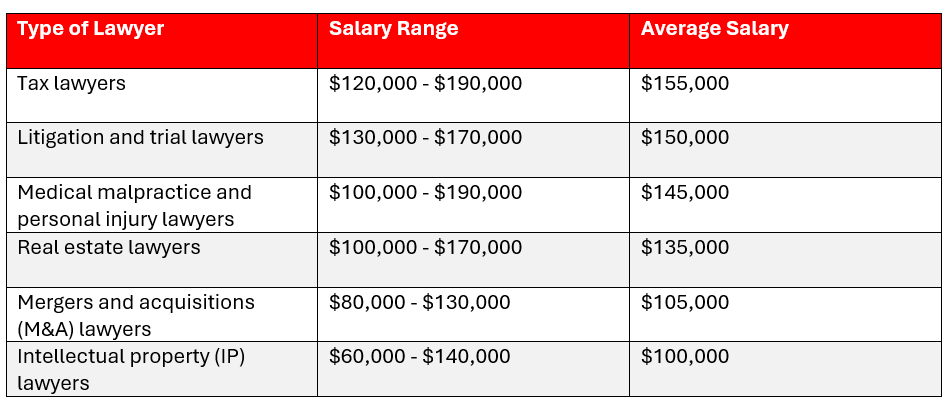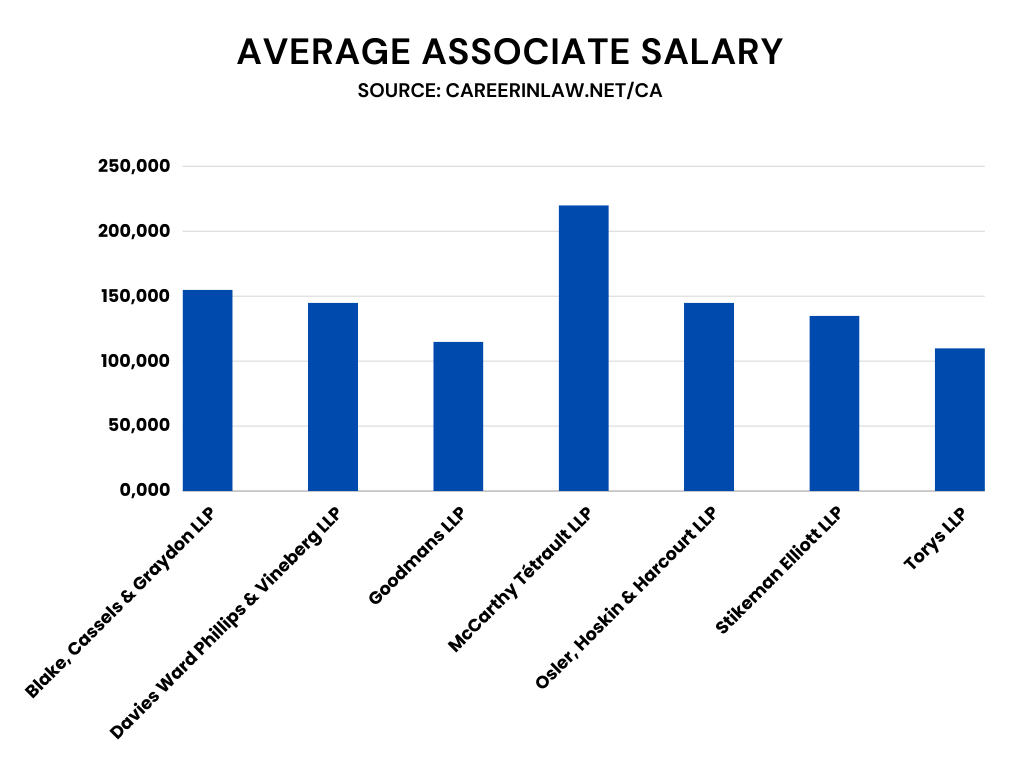
This article answers what lawyers make the most money and the factors that affect a lawyer’s pay cheque

Law students and new lawyers alike would ask, “what lawyers make the most money?” Answering this question is not as simple as mere legal advice but needs understanding of the different factors that will affect a lawyer’s pay cheque.
This article is for future (and existing) lawyers who are wondering how much they can earn. Employers in the public and private sectors can also use this article to know the current trends of employing lawyers in Canada.
Here are some examples of lawyers that earn relatively higher salaries. The amounts indicated below are estimates.
Salary: $100,000 to $190,000 per year
Personal injury lawyers need not be expensive. But when a case involves a significant settlement, this is also a success for the lawyer who will get a part of it in certain payment arrangements, i.e., contingency fee.
Have an idea of the work of personal injury law firms and lawyers through this interview with one of the top personal injury boutiques in Canada:
For other articles in this practice area, check out our Personal Injury page. It discusses important settlement cases and other updates on personal injury law.
Salary: $120,000 to $190,000 per year
Heavy is the burden of tax lawyers, which justifies this large compensation afforded to them. This is because aside from administrative and civil penalties that can be imposed on an erring individual or corporation, criminal liability is also attached to certain violations. The level of expertise is also a consideration for the high pay of tax lawyers.
Salary: $130,000 to $170,000 per year
Whether you’re handling civil and criminal cases, litigation and trial lawyers are some of the lawyers that make the most money. However, not all cases that go to trial would pay off handsomely. High profile cases and those that involve larger sums of money or property mean fat pay for litigators.
Salary: $100,000 to $170,000 per year
High-valued properties and transactions that are handled by real estate lawyers also benefit them, as its consequence is a large pay for them. Lawyers have an important role in real estate transactions. They prepare and review legal documents and perform due diligence. With properties changing ownership every now and then, real estate lawyers are not going anywhere soon.
Salary: $80,000 to $130,000 per year
M&As is another area where lawyers are necessary in all stages — from its conception until the closing day. The frequent changes to corporate and business ownership also prompt the need for M&A lawyers, whose transactions are a source of good pay for them. For these M&A lawyers, there’s a lot of work, but a lot of good pay cheques.
Salary: $60,000 to $140,000 per year
Although Canadian IP law has long been established, its recent application through the internet and modern technology has made this practice area alive and well. When many businesses need technological protection for the IPs, lawyers come into the picture.
Here’s a summary of lawyers who make the most money:

If you’re an aspiring law student who is thinking about which field to specialize in, look at our complete list of law schools in Canada. It includes areas of specialization, requirements, and notable faculty members for each law school across the country.
Read next: Books for aspiring law students
There are several factors that affect how much you’ll earn as a lawyer. Here are some of them:
You can watch the video below which discusses the two ways lawyers are paid by law firms: the merit-based method and the lockstep method. It also discusses why firms do away with the lockstep method, and the advantages of the merit-based method:
Recent changes in competition law are expected to impact lawyer salaries across Canada.
Lawyers are always on the lookout for the best employers to work for. Some of the considerations when looking for a job are the mental, social, and financial benefits that an employer has to offer. When it comes to the financial benefits, you may be looking for a job that will give you the highest salary.
Let’s look at which lawyers make the most money: those in private practice, or those in government.
Salary: $100,000+ to $200,000+ per year
Not all law firms pay their lawyers equally; some earn more than the others because of these factors:
According to a Canadian career website, here are the top-paying law firms, also called the Bay Street firms or the seven sisters law firms:

Our annual legal workplace survey found that it’s not always the larger law firms that pay the highest. Smaller Canadian firms also pay their lawyers on a par with the larger firms. This factor, among other non-financial benefits that they offer to employees, are the factors that new lawyers consider in joining and staying in a firm.
Another factor is whether you’re working in private practice or in-house. They each require different skillsets from a lawyer. Here’s a quick look at how these two differ, when it comes to a lawyer’s pay:
|
In-house counsel |
Lawyers in private practice |
|
No need to track billable hours as they are considered salaried employees |
Billable hours are tracked, which is the main basis in billing clients |
|
May earn less than lawyers in private practice |
May earn more when handling complex and high-profile cases |
Salary: $50,000+ to $200,000+ per year
Government lawyers are those who work in an agency, body, office, or tribunal. That could be with the federal, provincial or territorial government. Also called public sector lawyers, their salaries are tied to what the government prescribes for their specific position.
Here are some ways lawyers can get jobs in government:
The factor that will affect how much you’ll earn as a lawyer is the type of lawyer that you’ll become (or you’ve become).
Due to the legal profession’s nature, a lawyer is not confined just to a single practice area or kind of lawyer they’ve branded themselves. This specific kind of lawyer may be an expert in different practice areas, which helps them in their practice of law.
For instance, corporate lawyers in Canada are also engaged in different legal practice areas, depending on the legal matter that their clients are faced with. Aside from having an extensive knowledge of Canadian corporate laws, they may also have to touch on the other practice areas such as:
Knowing what lawyers make the most money can be viewed in relation to the area of law which they have specialized in. Canadian law can be divided into several areas of specialization, and these have an impact on how much lawyers will earn.
Here are some influencing factors:
The lawyers that make the most money in Canada will depend on many factors. It includes who they’re working for, the expertise of the lawyer, the area of law they’re practicing in. But no matter the pay, lawyering has always been more than earning large sums of money. It’s being part of serving justice for the clients and giving the best legal advice and representation for those who are in need.
If you want to know how lawyers get paid in Canada, read this guide.
Read and bookmark our page on Practice Management for best practices in running a law firm, including insights on lawyers’ pay and benefits.